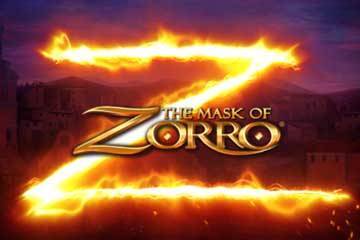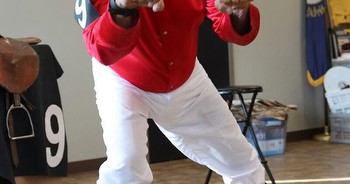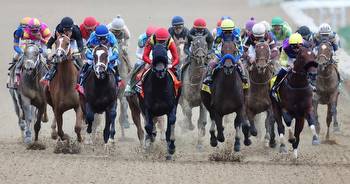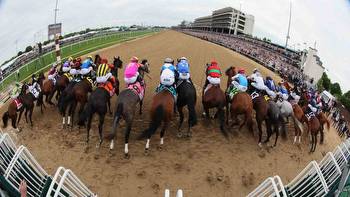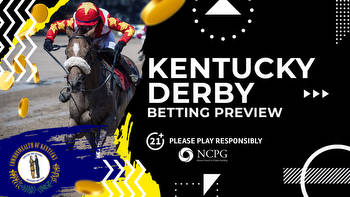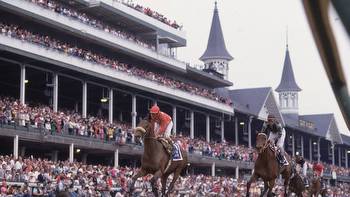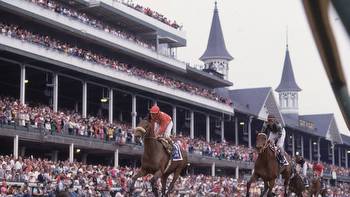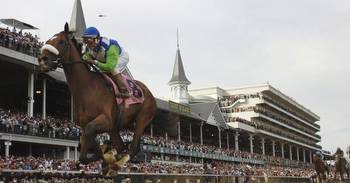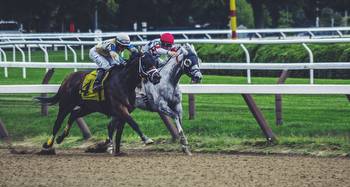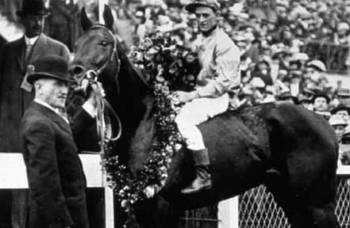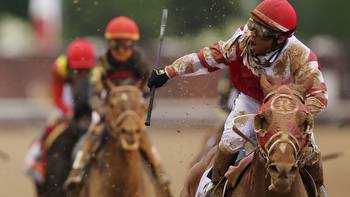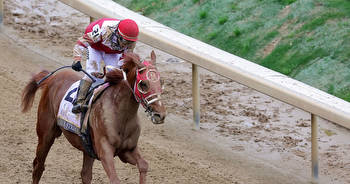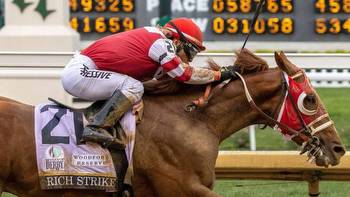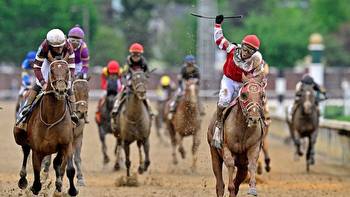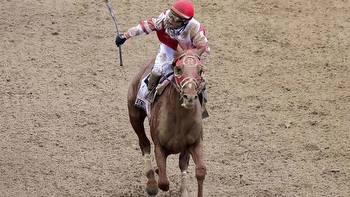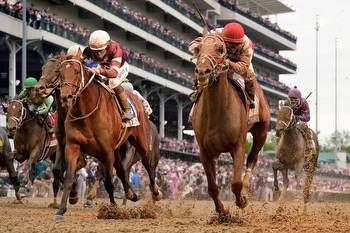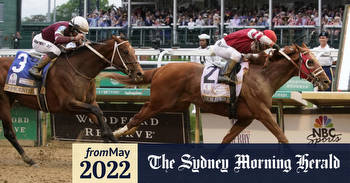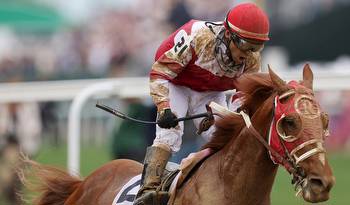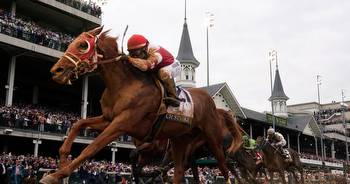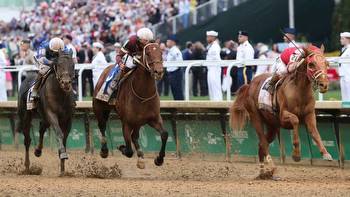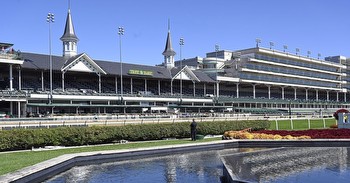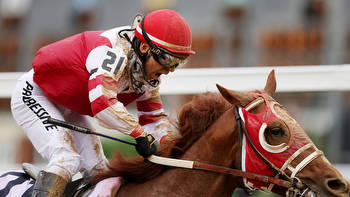My Family and the 1913 Kentucky Derby: A Conspiracy?
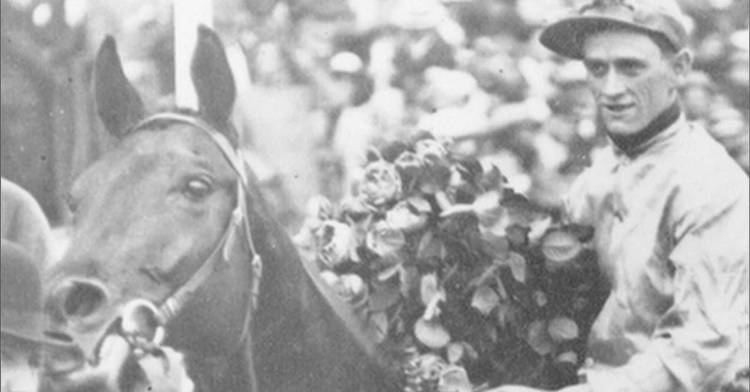
“He jumped out and I damn near fell off,” is how my Great Great Uncle Roscoe “Golden Goose” Goose so eloquently described the colt Donerail’s unexpected move that resulted in the greatest longshot win in Kentucky Derby history on May 3rd, 1913.
Two weeks earlier Carl Ganz won the Kentucky Oaks jockeying the filly, Cream. Now there’s not anything terribly unusual about that race except for that the Oaks and Derby were run two weeks apart, and that Carl Ganz was Roscoe Goose’s younger brother. Roscoe was already established as a jockey, so when Carl began his own jockeying career he chose to ride under the name of Ganz, the German version of Goose, to avoid confusion with his brother. With the races not occurring in back-to-back days as we know it today and with their surnames being different, the story of my Great Great Uncles winning both major races in the same year has been somewhat lost over time. This definitely does not piss off my family tremendously.
But the story that has not been forgotten is the story of Roscoe Goose riding Donerail, a colt with 91-1 odds, to capture the 1913 Kentucky Derby. Donerail almost didn’t even run in the race as owner and trainer T. P Hayes, wasn’t keen on running Donerail. My cousin, Carla Grego, explains in a great article about our uncles and family that “Hayes had been very impressed with Donerail over the winter of 1912 and had bragged about him to his friends. They took him at his word and bet heavily on Donerail in the future bets for the Derby. This did not sit well with the owner, who watched the odds rapidly drop on his horse. Hayes also liked to place a wager on his horses and he felt he had ruined his chance of getting a big payoff by talking about his horse too much, too early. And then the horse turned in a poor performance in his last race at Keeneland before the Derby. It was then that Hayes made the decision to not run his horse and instructed the jockey to try to find another mount for the race. Roscoe was downhearted as he felt the horse had a legitimate chance to win. Roscoe continued to lobby Hayes to give the horse a chance. Hayes finally conceded to run the horse and instructed Roscoe to just try to get a piece of the purse, which he certainly did!”
The back of a Donerail trading card (yeah, they make them for horses too) describes the race: Roscoe and Donerail lined up in the gate next to race favorite, and 1-1 odd Ten Point. “The four previous Derby winners had led virtually the entire way and Ten Point went to the front immediately, opening a three-length lead down the backstretch. At the head of the stretch, however, Ten Point began to weaken, and starting to gain ground in a totally unexpected move was Donerail … ‘When I clucked to Donerail, he started passing up horses like a passenger train going past a freight train,’ jockey Roscoe Goose would say later. Charging down the stretch, Donerail suddenly shot into second place. ‘I never saw a horse move so fast in all my life,’ Goose declared … Donerail passed the tiring Ten Point inside the eight pole and drew away to win by a half-length.” Roscoe Goose would go on to be dubbed “The Golden Goose.”
Donerail and his 91-1 odds to this day remain the greatest longshot to win the Derby, which means a $2 bet to win would have won a bettor $184.90 (approximately $5,637.32 today). With pari-mutuel wagering and an underdog-loving society today, it’s unlikely that we’ll ever see anyone come close to this record. The closest we’ve seen anyone come was actually last year when Rich Strike won at 80-1. Roscoe was also the first Louisville native to win the Derby.
As you, dear readers, can imagine, my family and I are very proud of our ancestors and their places in the history of Churchill Downs, the Kentucky Derby, and the Thoroughbred industry. But something that my family talks about very little publicly is how “coincidental” it is that Roscoe Goose, the jockey of the horse with the greatest odds to ever win the derby, is also brothers with my Great Grandfather, J.W. “Bill” Goose.
Oh, you don’t know Bill Goose?
We’ll let the Courier-Journals 1946 article about him give the introduction: “J.W. ‘Bill’ Goose, the oft-arrested but never jailed Louisville gambler.”
You see, Bill Goose was a prominent local gambler and club owner for many years. He and Roscoe operated a nightclub called the Sycamore Café at 238-240 Central Avenue. In the 1947 lawsuit Goose v. Commonwealthit was revealed after “numerous raids by police officers” that “extensive taking of bets on horse races and other forms of gambling with cards, dice and other devices” had taken place at the Sycamore Café. The summary goes on to say that “J. William [Bill] Goose and Luther Goose (another brother) were arrested a number of times on charges of suffering gaming on the premises, gambling, disorderly conduct, malicious assault and other offenses.”
Bill also co-owned and operated the Flamingo and Iroquois nightclubs where Bill was arrested multiple times for ALLEGEDLY operating handbooks, dice games, cockfights, and poker games, as well as for ALLEGED assault and battery.
Oh yeah, and that kind introduction the C-J gave us earlier, that was from this article:
The C-J explains that on the night of October 22nd, 1946 my sweet great grandfather was asleep in his houseboat parked on Crittenden Drive (no, there wasn’t water there then either) when two armed men approached his residence(?) to “collect a debt” which Bill “did not acknowledge.” Bill shot his shotgun through the door instantly killing one of the men while the other man escaped with a life-threatening wound to his arm. Bill was charged with manslaughter and shooting and wounding, but plead self-defense. I can’t find any info on what happened with this case, but since Bill never went to prison I’m guessing either the charges were dropped or he argued self-defense successfully.
The debt (ALLEGED!) that the men came to “collect” apparently stemmed from some I.O.Us one of the men had endorsed for Bill in a New Albany poker game and had been forced to pay them, without repayment from Bill. Another version is that the “debt” (ALLEGED!) stemmed from when one of the men worked as a manager of the Sycamore Café when Goose was owner. The Sycamore Club had been robbed of $6,500 in 1943 and the man claimed that a fifth of it was his and “dunned Goose for unsuccessful repayment.”
Now I don’t bring up my great grandfather’s ALLEGED checkered past or the fact that he LIVED IN A HOUSEBOAT ON CRITTENDEN DRIVE to smear his name or our family’s proud history. But! Imagine if on Saturday we saw a horse break the record for the greatest longshot to ever win the Derby only to find out that the jockey has extremely close ties to an ALLEGED local bookie. Can you imagine the media firestorm that would follow?
So, let’s rewind back to over 100 years ago when the Derby wasn’t as widely renowned as it is today, when it really was just a regional race, and tell me that it’s impossible for a local bookie to have any influence on the odds of a horse. Especially one that his brother is supposed to jockey. Makes you think, huh?
With my tinfoil hat off, I do want to say that this is just a fun conspiracy theory that my family has kicked around for some time and that we wanted to finally share. It’s obviously one that you could easily poke holes in, especially considering Bill was only 16 years old in 1913 (oops, forgot to mention that important note). Or you could make a movie out of it. Seriously, if you want to pay my family for the story and make a movie. I’m all ears and I’m very cheap.
All jokes aside, Roscoe Goose has a tremendous reputation and legacy in the Thoroughbred racing industry as a jockey, as well as a trainer and an owner. Apart from his legendary Derby win, he was also renowned for fighting hard for safety regulations to protect both the jockeys and horse. Sadly, his brother Carl suffered a fatal head injury in 1915 during a race. The accident happened at a time when jockeys wore only a satin cap, without even the leather skull cap that was introduced shortly after. Roscoe lobbied hard for a stronger, safer jockey helmet to be made. In 1963 he was inducted in the inaugural Kentucky Athletic Hall of Fame class. Bill certainly had a colorful life, but was also a very fun and interesting grandfather, from what I’ve been told.
You can visit Roscoe’s bronze plaque in Freedom Hall or his house and its historical marker at 3012 S 3rd St. And you can look for Donerail’s name hung near the paddock at Churchill Downs, if you’d like.
You cannot, however, visit Bill’s houseboat on Crittenden Drive.
